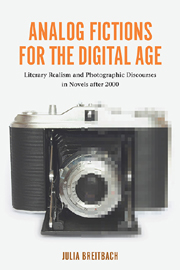 Analog Fictions for the Digital Age
Analog Fictions for the Digital Age Book contents
- Frontmatter
- Contents
- Acknowledgments
- Introduction: Toward a Photographic Reading of Literary Realism
- 1 Photography in the Digital Age: Critical Contexts and the Question of Realism
- 2 This Thing in the Text: Photography, Thing Theory, and the Return to Realism in Literature
- 3 Liminal Realism: Don DeLillo, The Body Artist (2001)
- 4 Domestic Realism: Ali Smith, The Accidental (2005)
- 5 Poetic Realism: Michael Ondaatje, Divisadero (2007)
- 6 Conclusion: The Way We Write Now—A Case for Realism(s)
- Works Cited
- Index
4 - Domestic Realism: Ali Smith, The Accidental (2005)
Published online by Cambridge University Press: 05 April 2013
- Frontmatter
- Contents
- Acknowledgments
- Introduction: Toward a Photographic Reading of Literary Realism
- 1 Photography in the Digital Age: Critical Contexts and the Question of Realism
- 2 This Thing in the Text: Photography, Thing Theory, and the Return to Realism in Literature
- 3 Liminal Realism: Don DeLillo, The Body Artist (2001)
- 4 Domestic Realism: Ali Smith, The Accidental (2005)
- 5 Poetic Realism: Michael Ondaatje, Divisadero (2007)
- 6 Conclusion: The Way We Write Now—A Case for Realism(s)
- Works Cited
- Index
Summary
Scottish short-story writer and novelist Ali Smith is often described as a “literary writer.” The epithet refers to, on the one hand, Smith's extraordinary sensitivity for narrative style and voice and to her self-reflective wit in foregrounding and recasting literary conventions, genres, and traditions. Her short-story collections, for instance, carry titles such as Other Stories and Other Stories(1999) and The Whole Story and Other Stories(2003), and her 2007 novel, Girl Meets Boy: The Myth of Iphis, rewrites a tale from Ovid's Metamorphoses. On the other hand, Smith's work is also considered “literary” for its meticulous attention to how language is a constitutive force, rather than a transparent medium, in the building and shaping of contemporary realities and identities. In Smith's fictions, language rules—and words, to quote from The Accidental (and Shelley), are the “unacknowledged legislators of the world” (72).
“Language is being,” Smith claims, “we are the words we use” (Jernigan 2002). In her five short-story collections and four novels to date, she sketches and animates characters not just through their actions, but also and particularly through the idiosyncrasies of their speech, their way of telling stories about themselves and others, their hiding beyond words or revealing their true colors in their utterances and thoughts.
- Type
- Chapter
- Information
- Analog Fictions for the Digital AgeLiterary Realism and Photographic Discourses in Novels after 2000, pp. 115 - 162Publisher: Boydell & BrewerPrint publication year: 2012
